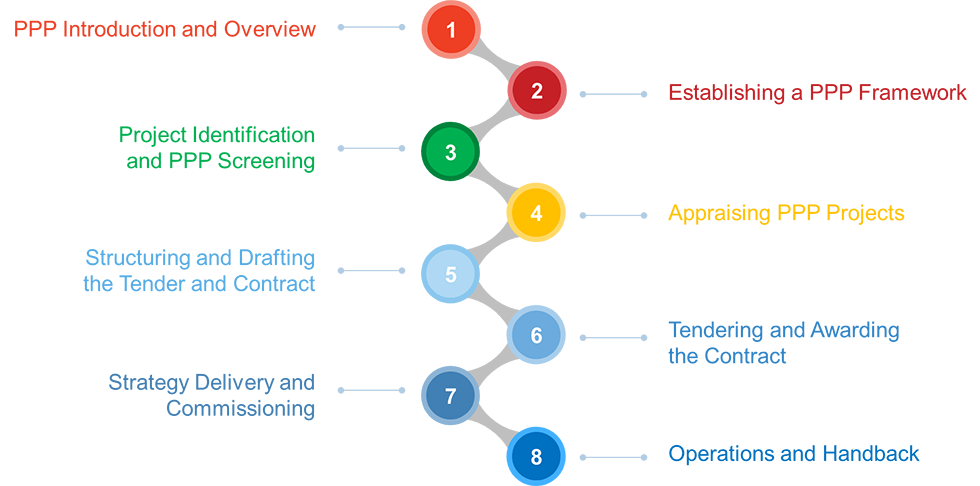In this page you will find an introductory description of the PPP Certification Program and the PPP Certification Guide.
K-infra is an organization created in 2016 dedicated 100% to the PPP field. A boutique specialized in PPP training, coaching and policy advisory with quality and excellence at the core of its strategy. K-infra’s CEO, Andrés Rebollo, has more than 20 years of experience, 60 structured PPPs and advised in all relevant sectors, and is a leading author of the PPP Expert Certificate Guide (CP3P© program).
K-infra is an Accredited Training Organization (ATO) by APMG International, a leader in the delivery of training for the PPP Certification Program (CP3P©), with 14 accredited trainers and +4700 trained professionals including professionals from the World Bank, IFC, IDB, ADB, EBRD, AFDB, CABEI, and representatives of more than 36 governments around the world as well as a number of the most relevant global PPP developers, financiers and consultants
APMG PPP Certification ProgramTM
The above mentioned program is developed and managed by APMG-International, an Institute of Global Accreditation created in 1993 with a wide portfolio of professional certifications.
The CP3P © Program is compounded by three exams corresponding to three levels (Foundation, Preparation and Execution), whose goal is to demonstrate sufficient mastery of the 8 chapters that compound the PPP Certification Guide.
You can find more visiting http://www.apmg-international.com

PPP Body of Knowledge: The PPP Certification Guide
Andres Rebollo is the Lead Author of the PPP Guide, supervising a group of international experts, and elaborating himself, with support of Richard Foster, a great part of its contents.
The PPP Guide can be downloaded free of charge
What is the PPP Guide about
- The main aim of the PPP Guide is to help the people in charge of the public sector / governments and its advisers to develop efficient and sustainable PPPs, helping them to apply “good practices” proven on a global scale and to facilitate the access of its PPP programs to the investors and developers market.
- The PPP Guide identifies the essential principles that rule the processes of Public Private Partnerships, at the same time tries to point some of the main “local or regional variations” that we can observe on a global scale.
- The PPP Certification Guide has free access, and here you can download it:
Contents of the PPP Guide
Chapter 1: PPP Introduction and Overview
- the typical characteristics of a Public Private Partnership Contract
- what is and is not a PPP
- terminological variations
- the basic structure of a PPP contract
- the instruments and structures of financing, and issues related with the projects bankability
- the benefits, challenges and dangers of the PPP
- the need of a PPP Frame
- the need for a careful management of the PPP Process
- the main phases and components of a PPP Process
Chapter 2: Establishing a PPP Framework
It describes the main elements of a PPP Frame and the challenges and keys of its implementation and functioning, emphasizing the description of:
- The role of the legal tradition and the legal and administrative instruments to create the frame
- The institutional responsibilities and the role of the PPP Units
- The frame of public financial management
- The function of supervision / evaluation ex-post of PPP Projects and Programs
Chapter 3: Project Identification and PPP screening
It describes the main aspects of a solid identification, explaining also how to analyze the appropriateness of a project to be developed as a PPP. Also it introduces the cost – benefit analysis (CBA).
Chapter 4: Appraising PPP Projects
It describes the requirements to perform the analysis and evaluation of a project, as well as how to prepare a PPP Project, including information / knowledge about the different analyses to be realized in this preliminary phase before taking the decision of investment and tender, especially the “analysis of commercial feasibility”, but also the VFM, analysis of the impact in public debt and others.
Chapter 5: Structuring and Drafting Tender and Contract
It describes how to design the strategy of PPP tender and the structure and design of the PPP Contract. It emphasize mostly the:
- the financial structure, the income systems and the payment mechanisms
- the allocation and structure of risks
- the key aspects of the design of the Requests for Qualification (RFQ) and Requests for Proposal (RFP)
- the incorporation for the RFP and Contract of the contractual structure and tender strategy
Chapter 6: Tendering and Awarding the Contract
It describes the main challenges and requests that affect the management process of tender from its start until the signing of contract. The Appendix of this chapter has to be highlighted, which reviews the vision and tasks of the private partner while regards the Preparation and Presentation of Offers and the financial closure, fulfilling this way the description of the PPP cycle from a standard view of the public partner.
Chapter 7: Strategy, delivery and Commissioning
It explains the need and importance of a proactive and prior strategy of contractual management. The main elements of contract management function and its main challenges, focusing in this way on the construction phase and “commissioning”.
Chapter 8: Operations and Hand-Back
It describes the relevant aspects, challenges and peculiarities of the contract management in the contractual operations phase, up to the reversion / hand-back of the assets in the moment of the contract termination.
CP3P Training
We deliver CP3P© Foundation, Preparation and Execution courses globally covering all geographies and times and most of the Program´s official languages.
Our courses are offered in in-house mode and open mode.
For knowing more about our CP3P Courses click here: https://www.k-infrastructure.com/en/cp3p-training/
For upcoming dates of our open courses globally please click here: https://www.k-infrastructure.com/en/cp3p-training/certified-ppp-professional-cp3p-courses/